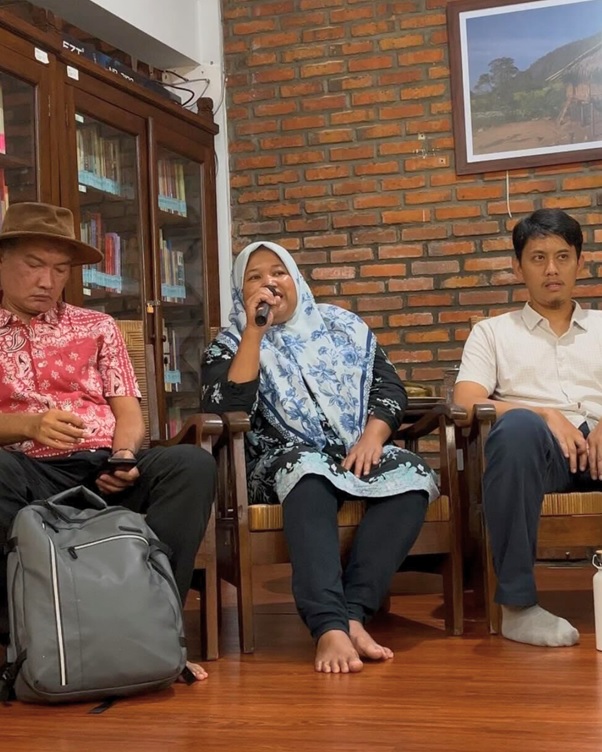THE STORY OF THE INDIGENOUS WOMEN OF KASEPUHAN KARANG IN MANAGING CUSTOMARY FORESTS
Field Conditions that Need to be Accommodated in the Amendment of the Forestry Law

Her name is Een. An Indigenous Woman whose full name is Een Suryani from Kasepuhan Karang. She resides in Lebak, Banten, only 105 km or a little over three hours away from Jakarta. Een became one of the speakers at the 10th HuMaVoice event. A monthly discussion forum organized by the HuMa Indonesia Association with the theme “Time for the Forestry Law to Change” at the HuMa Co-Working Space, South Jakarta (01/23/2025).
Een and other indigenous people from Kasepuhan Karang are located in the forest area of Gunung Halimun Salak National Park, which has been designated as customary forest. The Ministry of Environment and Forestry (currently the Ministry of Forestry) issued Decree Number: SK.6748/MENLHK-PSKL/KUM.1/12/2016 concerning the Designation of Kasepuhan Karang Customary Forest covering 462 (Four Hundred Sixty-Two) Hectares in Jagaraksa Village, Muncang District, Lebak Regency, Banten Province dated December 28, 2016.
Een recounted the period before and after the recognition of the customary forest. Een explained that before the recognition of the customary forest, women in Kasepuhan Karang who managed the forest felt anxious and lacked the enthusiasm to manage the forest, but after it was acknowledged and recognized, we felt more relieved and enthusiastic to manage the forest. She shared that after the recognition, the residents gained a lot of experiences because many people visited, especially regarding women’s empowerment. She explained that in the past, women there did not want to meet outsiders, but now female guests are welcomed more openly.
However, according to Een, life there is not just about the forest, but there are other aspects like education and health. She feels that until now, these aspects have not been facilitated by the government. Overall, although there has been an improvement with the designation, the government still has tasks to accomplish.
Furthermore, Een mentioned that the schools there are very far away, with only early childhood education (PAUD) and elementary schools (SD) accessible, while junior high and high schools require a long journey to reach. Another issue is that without transportation, students cannot attend school. She also mentioned that generally, only boys attend school there, while girls usually only attend until elementary school before focusing on farming and getting married.
Another speaker, Andiko, a member of HuMa, explained that Een’s experience is just a small snapshot, and there are still many issues that need to be addressed. For example, there are still many roads that are not in good condition, making economic circulation a bit difficult. Local village governments usually argue that forest roads have conservation status, so they cannot be improved. Andiko then gave an example of cases in other countries where access is provided even within conservation areas.
According to Andiko, from a Human Rights perspective, access is crucial for every individual. Therefore, villages in forest areas should also have equal and fair access.
Een hopes that the government can directly observe the indigenous communities. She believes that the government should pay attention to our way of life and our sustainability, such as access to education, healthcare, and infrastructure. She appeals to the government to also look into




0 Comments
Leave a Reply